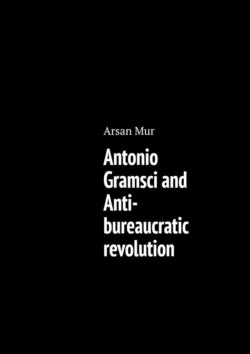Antonio Gramsci and Anti-bureaucratic revolution

Реклама. ООО «ЛитРес», ИНН: 7719571260.
Оглавление
Arsan Mur. Antonio Gramsci and Anti-bureaucratic revolution
Content. Introduction
Modeling the Revolution
3.1 Analysis criteria
3.2 Anti-bureaucratic revolution
Conclusion
Bibliography
Отрывок из книги
The social and political reality of the modern world is immanent in the process of permanent confrontation between political entities, a considerable part of which have no institutional legitimacy and carry out the intention to gain it. Speaking of countries traditionally referred to the “West”, we see this process as a crisis of the legitimacy of the dominant political institutions. Increased pressure from migrants (including in the form of terrorist attacks) and the growing need for direct military participation in conflicts led by forces that are not legitimized by the UN and often oppose the very principle of legitimacy of nation-states as a form of political domination. The process mentioned above is also clearly manifested in the Middle East, where the collapse of ideocratic dictatorships, which had the design of modern states and were former members of the UN, leads to the formation of large but not internationally legitimate political actors, carrying out a revolution not only against modern political regimes, but also against the principle itself the legitimacy of international political structures and the national state in its modern sense. Some regions and states that proved to be insufficiently resistant to opposing revolutionary processes within society become a place of permanent confrontation of illegitimate political actors, a place of permanent chaos and civil war, and successful examples of the opposition of the state to revolutionary gravitations of a part of society indicate that the political defeat of modern political structures does not predetermined, and, therefore, the state seeking to avoid revolution and its collapse, has the ability and the need to study the revolutionary processes in other countries and to study oneself, one’s society in order to prevent events that could bring down the institutional framework of the state.
Russia is a country that is also threatened by the above-described revolutionary processes carried out and coordinated by outside political actors. Such dangers are aggravated by the fact that the real life of Russian society is poorly understood, social processes that can acquire political significance often become a public fact only after sudden breakthroughs in the media environment. Therefore, there is a great need to build methods and forms of analysis of revolutionary sentiments that are suitable specifically for Russian society and the state, which, in turn, requires independent and creative work on the synthesis of classical concepts of revolution and the creation of distinctive, but adequate methods for analyzing the dangers of the revolutionary plan.
.....
The thinker also strongly advised the rulers to believe that they could either constantly deceive a few people, or all people for some time, but never – all people and always. An attempt to constantly deceive the whole state, according to Aristotle, will inevitably end in a revolution.
He also said that rulers should exercise due care in relation to their subjects: they should not distinguish between an officer and a commoner, between leading and non-leading, etc. To prevent a revolution, according to Aristotle, it is necessary to observe the principle of democratic equality.
.....